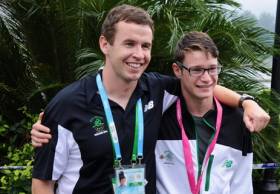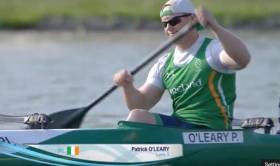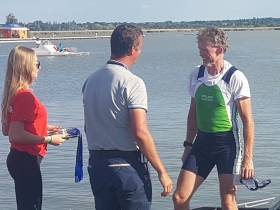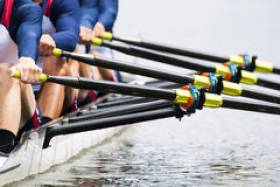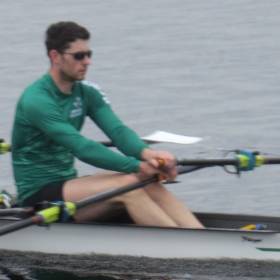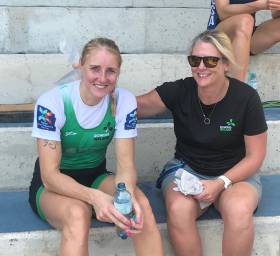Displaying items by tag: Ireland
Hendrick Qualifies for World Championship Semi-Finals
#Canoeing: Robert Hendrick qualified for the semi-final of the C1 (Canadian canoe) at the canoe slalom World Championships at La Seu d’Urgell today.
The Kildare man took 10th place in his second run – just inside the crucial cut-off point. Hendrick’s 99.03 seconds with no time penalties put him in 11th in the first set of results, but Italy’s Roberto Colazingari was then given a 50-second penalty for missing a gate and dropped out of the top 10. Hendrick had made it through.
Hendrick will qualify Ireland for a place in the C1 in Tokyo 2020 if he can place in the top 11 nations in the semi-finals.
Liam Jegou finished 13th, missing out on a qualification spot because of a two-second penalty for a touch on gate 11. Jake Cochrane, who was less than half a second outside qualification in the first run, did not do so well second time around and finished 49th. He missed gate five and incurred a 50-second penalty.
Canoe Slalom World Championships, La Seu d’Urgell, Spain (Irish interest)
Men
C1 – First Run (top 20 qualify directly): 26 J Cochrane 99.72, 38 R Hendrick 103.68, 46 L Jegou 106.38. SECOND RUN (top 10 to semi-finals): 10 Hendrick 99.03; 13 Jegou 99.62, 49 Cochrane 151.72
Women
K1 – First Run (top 20 qualify directly): 72 H Craig 182.68, 75 A Conlan 195.02, 76 C O’Ferrall 245.62. SECOND RUN (top 10 to semi-finals): 41 Conlan 133.13, 45 O’Ferrall 148.39, 51 Craig 174.61
O'Leary Fourth at Test Event in Tokyo
#Canoeing: Ireland paracanoeist Patrick O’Leary finished fourth in the final of the va’a (VL3 single) at the canoe sprint Test Event at the Sea Forest Waterway in Tokyo. The Corkman has qualified this boat for the Paralympic Games. In the KL3 (kayak) final, O’Leary took seventh.
The venue will hold the sprint canoe and rowing events for the Olypmic Games and Paralympic Games in 2020.
Olympic and Paralympic Test Event, Sea Forest Waterway, Tokyo, Canoe Sprint (Irish interest): KL3 - Final: 7 P O’Leary 46.86. VL3 – A Final: 4 O’Leary 55.623.
Crowley Leads Ireland to More Masters Wins in Hungary
#Rowing: Irish crews added four more wins to their haul over the weekend at the World Masters Regatta at Lake Velence in Hungary. The wins came on Saturday. Denis Crowley featured in a composite eight, which beat strong British opposition, and in a four – bringing his personal tally to eight wins. Brendan Smyth and Patrick Fowler of Commercial won in the double and Milo and Pat Murray of Cappoquin won the in the pair. A mixed eight finished second on Sunday.
World Masters Regatta, Lake Velence, Hungary (Selected Results; Irish interest; Winners)
Saturday
Men
Eight (E – avg 55 or more): Galway, Belfast BC, Neptune, Clonmel, Commercial, Shannon (G Murphy, A McCallion, K McDonald, D Crowley, F O’Toole, O McGrath, G O’Neill, C Hunter, M McGlynn) 3:04.90
Four (D – avg 50 or more): Commercial, Neptune (B Smyth, F O’Toole, G Murphy, D Crowley) 3:24.72.
Pair (F – avg 60 or more): Cappoquin (P Murray, M Murray) 6:12.10.
Sculling, Double (C – avg 43 or more): Commercial (B Smyth, F Fowler) 3:28.39.
Crowley a Six Shooter at World Masters Regatta
#Rowing: Denis Crowley of Commercial brought his tally of wins to a remarkable six after three days at the World Masters Regatta in Budapest. In just one day, the 57-year-old won in the coxless four and twice in the single sculls – in the C class (43 years or more) and the E class for 55 or more. The decision to form composite crews again paid off for the Irish, with wins in the C eight and the D coxed four, along with Crowley’s haul.
World Masters Regatta, Budapest, (Selected Results, Irish interest, winners)
Friday
Men
Eight
(C – 43 or more): Heat Four: Commercial, Cork, Neptune, Clonmel, Shannon, Galway, Castleconnell (B Crean, B Smyth, R Carroll, O McGrath, G O’Neill, P Fowler, B O’Shaughnessy, K McDonald; cox: M McGlynn) 3:09.75.
Four
(E – 55 or more) Heat Five: Commercial, Neptune, Belfast BC, Galway (D Crowley, G Murphy, C Hunter, A McCallion)
Four, coxed
(D – 50 or more) Heat 3: Galway, Neptune, Castleconnell, Clonmel (G O’Neill, O McGrath, B O’Shaughnessy, T Dunn; cox: M McGlynn) 3:35.89.
Sculling, Single
(C - 43 or more) Heat 19: Commercial (D Crowley) 3:49.92.
(E – 55 or more) Heat 8: Commercial (Crowley)
Irish Composite Crews Lead the Way at World Masters
#Rowing: A composite of five crews – Galway, Neptune, Commercial, Clonmel and Cork – won in the men’s eight for 50 and over at the World Masters Regatta in Budapest. It was one of a sequence of wins for the Irish at the huge event.
Brendan Smyth and Patrick Fowler, rowing for Commercial, won the Pair in the A class, while Denis Crowley and Tony Corcoran won in single sculls.
Two C fours (43 or more) won and an E coxed four (55 or more) also took the honours.
World Masters Regatta, Budapest, (Selected Results, Irish interest, winners)
Wednesday
Men
Four, coxed E (55 or more) – Heat Four: 1 Belfast BC, Commercial, Galway, Leichhardt RC (C Hunter, A McCallion, M Heavey, G Canning; cox: JM Marks) 8:05.40
Thursday
Men
Eight (D – 50 or more) – Heat Two: Galway, Neptune, Commercial, Clonmel, Cork (B Crean, B Smyth, R Caroll, O McGrath, G O’Neill, P Fowler, D Crowley, G Murphy; cox: M McGlynn) 3:05.06.
Four (C – 43 or more): Heat Three: Commercial, Galway, Clonmel, Neptune (R Carroll, O McGrath, P Fowler, G O’Neill) 3:15.28. Heat Six: Commercial/Neptune (D Smyth, F O’Toole, G Murphy, D Crowley) 3:15.54.
Pair (A – 27 or more): Heat Three: Commercial (P Fowler, B Smyth) 3:32.68
Sculling, Single – (D – 50 or more) – Heat 15: Commercial (D Crowley) 3:55.15.
(H – 70 or more) – Heat Eight: 1 T Corcoran 4:27.08.
Byrne Adds Under-23 Gold to World Championship Silver Medal
#Rowing: Ronan Byrne won gold for Ireland at the European Under-23 Championships in Ioannina, Greece, this morning. He beat Russia’s Alexander Vyazovkin by four seconds in the single sculls final.
The Ireland women’s coxed four took fifth in their straight final, while Hugh Moore was fourth in his B Final of the lightweight single, 10th overall, and the double of Alex Byrne and Ross Corrigan took second in their C Final, 14th overall.
European Under-23 Championships, Ioannina, Greece, Day One (Selected Results; Irish interest)
Men
Double Sculls – C Final: 2 A Byrne, R Corrigan 6:43.69.
Single Sculls - A Final: 1 R Byrne 6:48.28.
Lightweight Single – B Final: 4 H Moore 7:30.07.
Women
Four, coxed - Final: 5 Ireland (C O’Brien, K Shirlow, L Murphy, N Casey; cox: A Humphries-Griffiths) 7:20.37.
Puspure Talks of Highs and Lows of Extraordinary Season
#Rowing: Sanita Puspure says it was harder to defend her World Rowing Championship title that it was to win it for the first time. "Mentally I think [it was harder]. Everyone is looking at you. You're the one to beat and you're like 'oh stop now' but that's what it was. You just try to ignore it as best you can.”
Puspure, an ambassdor for Indeed, the partner of Team Ireland, was speaking in Dublin after her win in the singles sculls at the World Rowing Championships in Austria. She also qualified the boat for the 2020 Olympic Games.
The world champion spoke about the programme which has brought her along. “We have a really good nutritionist, Sharon Madigan, working with us, making sure we're fueling properly for the loads we're doing. That's made a massive difference. I used to get ill quite a lot while training whereas now I occasionally get a head cold. The training is way more consistent."
Her competition schedule during the summer was hit by the illness and subsequent death of her sister Inese. Puspure competed at the European Championships (she won), but missed the final World Cup regatta in Rotterdam.
“(Inese) was getting worse rapidly, so I went over for a few days and then I was home for a little bit. And then I was in Latvia for three weeks and she passed away the same week the World Cup was on.
"It was scary because I had very mixed emotions. I thought I should be at home training but at the same time, I wanted to spend some quality time with my sister because I knew she was going to pass away soon.
"It was really hard being so conflicted within myself and not knowing what to do. Because of that, the medal has very high value. And we just needed something nice to happen."
She paid tribute to her sport pyschologist, Kate Kirby.
"Even if it was just to seal the qualifying place, I should be happy with that. And there were times when I thought if I just qualify I'll be fine. But then a few hours I'll be 'no I won't be fine, I don't want to just qualify. I want to repeat what I did last year or even just get on a podium.' It was a difficult time but I'm really glad we got on the other side of it."
The new programme in this Olympic cycle also capitalised on the strengths she had and built her self-belief, which had not always been strong.
“Yeh, I think a bit of a lack of self belief, definitely.” She was lucky to have “great physiology” but it may have been better technique and the “harsh training we started two years ago that really kind of gave the confidence”.
She also paid tribute to her family and her supportive team-mates.
Team Ireland has updates and behind the scenes action: @IndeedIreland #TalentUnleashed.
Puspure Wins Gold, Silver for Doyle and Byrne at World Rowing Championships
#Rowing: Sanita Puspure and the men's double scull of Philip Doyle and Ronan Byrne took gold and silver for Ireland on the final day of the World Rowing Championships in Linz-Ottensheim.
Puspure was set a very hard challenge by her friend and rival Emily Twigg of New Zealand, who led right through the middle of the race.
On a hot day, Puspure had to call on all her resources to catch and then pass Twigg. She did this in the final quarter, and then drove on to win well.
Ireland completed the set of gold, silver and bronze medals at the World Rowing Championships as Philip Doyle and Ronan Byrne raced a brilliant second half of their double sculls final to take silver. China were outstanding, while Ireland trailed early on but built their speed and passed all the other contenders. They were less than a boat length away from China, who took the gold.
In the run-up to Sunday, the lightweight double scull had taken gold and pararower Katie O'Brien bronze.
World Rowing Championships, Linz-Ottensheim, Day Eight (Irish interest)
Men
Double Sculls - A Final: 1 China 6:05.68, 2 Ireland (P Doyle, R Byrne) 6:06.25, 3 Poland 6:07.87.
Women
Single Sculls - A Final: 1 Ireland (S Puspure) 7:17.14, 2 New Zealand (E Twigg) 7:20.56, 3 3 United States (K Kohler) 7:22.21.
McCarthy and O'Donovan Speed Past Opponents to Win Gold
#Rowing: Paul O'Donovan and Fintan McCarthy became the world champions in the lightweight double sculls with an outstanding victory over Germany and Italy here in Linz-Ottensheim.
The men in blue and red and white disputed the lead through the first quarter of the race, with Ireland a length behind in sixth. From there O'Donovan and McCarthy put the foot down. They set the fastest time for the next three quarters, accelerating into the headwind and clawing their way to level and then past their two big rivals.
They kept going right to the end and beat the Italians by just over a length, with Germany taking the bronze.
World Rowing Championshiops, Linz-Ottensheim, Day Seven (Irish interest)
Men
Lightweight Double - A Final: 1 Ireland (F McCarthy, P O'Donovan) 6:37.28, 2 Italy 6:39.71, 3 Germany 6:41.07.
Women
Four - B Final (First Two book Olympic places for boat): 1 Britain 6:55.08, 2 Canada 6:56.99; 3 China 7:02.28, 4 Ireland Ireland (T Hanlon, E Lambe, A Keogh, E Hegarty) 7:02.71.
Pair - B Final (First Five book Olympic places for boat): 1 Romania 7:18.88, 2 Ireland (A Crowley, M Dukarska) 7:20.68.
Lightweight Double Sculls - C Final (Places 13 to 18) 1 China 7:00.82; 5 Ireland (A Casey, D Walsh) 7:10.52.
Olympic Place Evades Ireland Women's Four at World Championships
#Rowing: Ireland's ambitions of booking a slot for a fifth boat at Tokyo 2020 came up short. The Ireland four of Tara Hanlon, Eimear Lambe, Aifric Keogh and Emily Hegarty had the difficult task of taking a top-two place in their B Final. They found their pace coming up to the line, but Britain, in lane five, and Canada in lane six took the crucial spots, with Ireland finishing fourth behind third-placed China.
The crosswind was a problem during the race and immediately afterwards the authorities redrew the lanes to acknowledge that lanes five and six were favoured.
World Rowing Championshiops, Linz-Ottensheim, Day Seven (Irish interest)
Women
Four - B Final (First Two book Olympic places for boat): 1 Britain 6:55.08, 2 Canada 6:56.99; 3 China 7:02.28, 4 Ireland Ireland (T Hanlon, E Lambe, A Keogh, E Hegarty) 7:02.71.
Pair - B Final (First Five book Olympic places for boat): 1 Romania 7:18.88, 2 Ireland (A Crowley, M Dukarska) 7:20.68.
Lightweight Double Sculls - C Final (Places 13 to 18) 1 China 7:00.82; 5 Ireland (A Casey, D Walsh) 7:10.52.


























